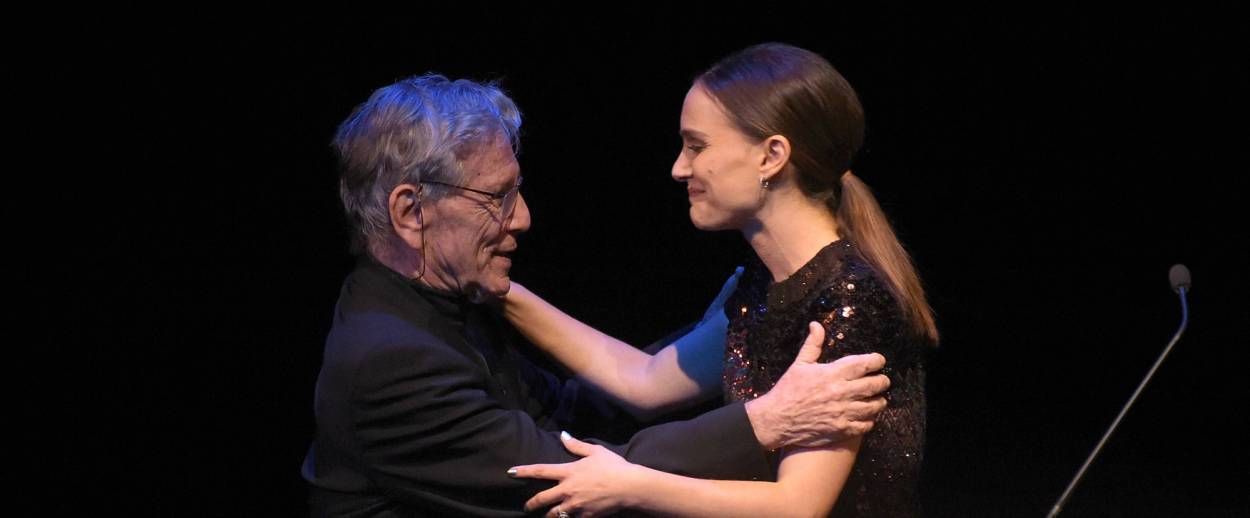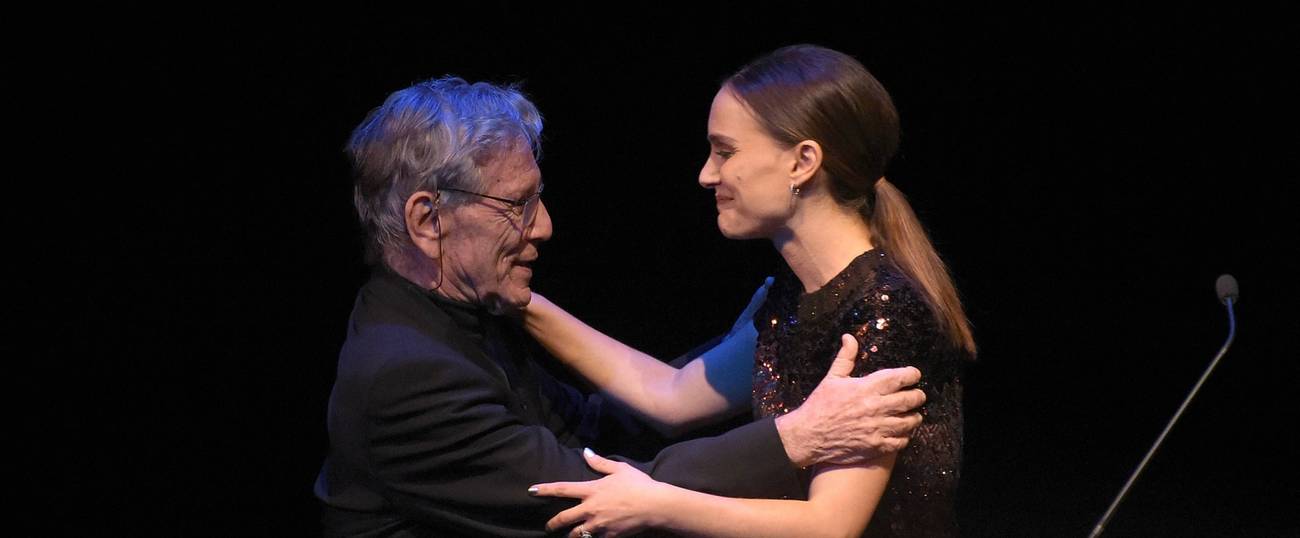Natalie Portman Adapts Amos Oz to the Screen
A dispatch from the Israeli premiere of ‘A Tale of Love and Darkness.’




In what may have been the most inappropriately located Israeli premiere since Quentin Tarantino screened Inglorious Basterds at Tel Aviv’s Azrieli mall, the stars of A Tale of Love and Darkness took to the coke-stained floors of Jerusalem’s gaudy and garish Cinema City on Thursday night. An adaptation of the much beloved autobiographical book by Amos Oz, the film was directed by the Israeli-born Natalie Portman, who also wrote the screenplay and starred in it (an American release date has not yet been announced).
Filled with cheap statues and loud music, Cinema City, which is Jerusalem’s first megaplex, is a far cry from the Jerusalem institutions of Oz’s youth. Former President Shimon Peres was in attendance, as was Jerusalem Mayor Nir Barkat. Oz wasn’t there, but shortly before the screening, his wife Nili was seen chatting warmly with ten year-old actor Amir Tessler, who plays a much younger version of her husband.
After the indefatigable Peres gave a lengthy introduction, Portman introduced the film in her nearly accentless Hebrew. She also begged the audience to switch off their cellphones. Though A Tale of Love and Darkness received mixed reviews when it was first screened at the Cannes Film Festival in May, it’s an ambitious undertaking on Portman’s part, and the result is often quite beautiful.
A Tale of Love and Darkness, the book, is Amos Oz’s masterpiece—an autobiography written as a novel, and the story of Oz’s childhood in Jerusalem in the years leading up to (and following) Israel’s statehood. It is also the story of his parents and ancestors, and in many ways the story of the Zionist movement and of the Jewish people in general. At nearly 600 pages in length, A Tale of Love and Darkness is not an easy read. But it has been translated into thirty-odd languages and sold upwards of a million copies worldwide.
Oz’s meandering prose doesn’t make for a seamless film adaptation, and the book’s non-linear narrative does not lend itself easily to a three-act structure. As is often the case with film adaptations, Portman’s Tale will leave many of the book’s fans unsatisfied, particularly when some of Oz’s most vivid characterizations are reduced to cameo appearances.
But there is also much to admire in the film. It is beautifully shot, by the Polish master cinematographer Sławomir Idziak. Idziak, working with the film’s production designers, faced the challenge of recreating 1940s Jerusalem on a shoestring budget. Outside of the Old City, it’s very difficult to find locations that haven’t changed dramatically since Oz’s youth; some panoramic shots barely leave out the city’s separation fence. And Kerem Avraham, the immigrant neighborhood that Oz grew up in, is now exclusively Haredi. (The film was shot in a less-Orthodox neighborhood, but the production was still met with protests from religious residents). The result of such constraints is sometimes claustrophobic – but then again, so is the Jerusalem of Amos Oz’s books.
The performances are uniformly strong. Young Amir Tessler, in particular, is a revelation. The dialogue is often lifted verbatim from the book, and one can almost hear the echoes of Oz’s cadences in Tessler’s delivery. Portman, as Oz’s mother Fania, becomes more magnetic as her character, struggling with depression, careens towards her fate. As Oz’s character remarks understatedly in the film, “if it were me writing the story, it would have had a different ending”.
In a recent interview with Israeli Channel 2 News anchor (and Tablet contributor) Yonit Levi, Portman said that Amos and Nili Oz loved the film, “and that was wonderful, because my primary concern was living up to my commitment to him.” Israeli critics, too, have so far been kinder than those at Cannes. Still, the best film version of A Tale of Love and Darkness may very well be a little-known documentary called Amos Oz: The Nature of Dreams. Though not a strict adaptation, it follows the themes of the book, and it mostly allows Oz to speak for himself. His ability to blend the personal and the political is unparalleled, and very tricky to pull off; when Portman injects the Arab-Israeli conflict into her film, it is a direct and necessary tribute to Oz, but it is also one of her Tale’s weaker moments.
It is in the story’s personal moments that Portman’s film excels, with its close examination of family life. As Portman’s character, Fania, says in both the book and the film, “no one knows anything about anyone else. Not even about a close neighbor. Not even about a spouse. Not about a parent, or your child. Nothing. And not about one’s self. We don’t know anything.” Oz’s work is a loving rebuttal of his mother’s admonition, and Portman’s Tale is a worthy homage to the best of that work.
Previous: Natalie Portman Hits Her Stride
Tal Kra-Oz is a writer based in Tel Aviv.